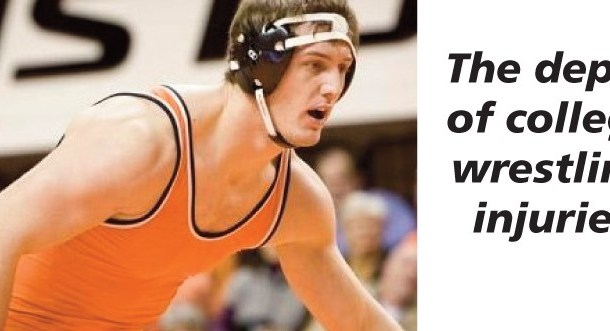Scholarship limits prevent Division I teams from developing quality depth to overcome injuries to star wrestlers

By Mike Finn
On Feb. 16 of this year, the Oklahoma State was on top of NCAA Division I wrestling world. The Cowboys were ranked No. 1 in national dual ratings and were about to remain the only undefeated team when they defeated Bedlam rival Oklahoma in between winning the NWCA National Duals Regional and hosting the National Duals Final Four in Stillwater.
Unfortunately for the Cowboys, heavyweight Alan Gelogaev — despite beating OU’s Kyle Colling to improve his season’s record to 24-0 and hold onto his No. 2 national ranking — suffered an pectoral injury and would be lost for the season.

Alan Gelogaev, an All-American for Oklahoma State in 2010, will miss his second national tournament because of injuries.
Since then, with true freshman Austin Marsden taking over the heavyweight spot in the lineup, Oklahoma State came up short in the National Duals and fell to Minnesota, 18-13, when Marsden lost to the Gophers’ Anthony Nelson, 8-1. Two weeks later, OSU lost the Big 12 tournament team championship after Marsden lost his title bout to Iowa State’s Matt Gibson, which prevented OSU from at least tying eventual champion Missouri for the Big 12 crown.
Gelogaev defeated both Nelson and Gibson during the season before his injury.
OSU coach John Smith does not like to put the blame on Marsden, a native of Crystal Lake, Ill., who enters this NCAA tournament with a 26-3 record. But the long-time Cowboy coach knows how much punch the Pokes are missing as this year’s national tournament begins March 15 in St. Louis.
“It’s hard to overcome losing a guy who was projected to be in the finals,” said Smith, whose team is ranked No. 4 in WIN’s Tournament Power Index behind No. 1 Penn State, No. 2 Iowa and No. 3 Minnesota. “As far as our team, when he was hurt, we dug our heel in pretty well. We’ve done everything that we could up to this point.”
There is no doubt that injuries are a common factor in a martial arts sport like wrestling — Iowa struggled this season when 2011 All-Americans Derek St. John and Grant Gambrall overcame injuries and Minnesota lost 2008 Olympian Jake Deitchler at 157 pounds this season.
“I think you are in a bind when one of your studs goes down,” said Iowa coach Tom Brands. “It’s probably one of the most frustrating and uncontrollable things that you deal with. It’s not something that you are prepared for even if you have experience with it. You have to make do, but at the same time how do you make do unless you have depth.”
“Unfortunately the system is not set up to develop quality depth.
“There are the challenges of tuitions and scholarships and I think you get less kids with the ten scholarships that you do get,” said OSU’s Smith. “Because of the economy, it costs more to get more kids.”
Ironically, Smith did have depth at 197 pounds where 2012 national qualifier Cayle Byers and Blake Rosholt were both nationally ranked at that weight this season before Byers eventually claimed the weight for postseason.
That is apparently a rarity in Division I wrestling.
“I only had it once when I had two quality guys in (2010 national champion Mark) Ellis and (Junior World champion Dom) Bradley at heavyweight where I had two guys who could step in and win a national title,” said Missouri coach Brian Smith. “It’s hard to have quality depth, especially when tuition goes up.
“The way the system is set up, 9.9 scholarships is not enough. We should have more scholarships and I don’t know if that will ever change, especially with tuition going up 7-10 percent. It’s a pretty blue collar sport. Kids are having a hard time affording school. That’s where it gets tough. Money is spread pretty thin when you’re looking for quality training partners.”
Iowa coach Tom Brands believes the sport needs to find a way to generate as much scholarship as a sport like basketball, which offers 15 scholarships in Division I.
“I don’t think the number of scholarships is going to change,” said Brands. “(Wrestling is) an Olympic sport, a non-revenue sport for a reason. We need to make wrestling a revenue sport. We need to make it relevant and then we can have a discussion where scholarships are increased.
“That’s probably 2-3-4 steps down the line before we get to that point. We need to get money infused into the sport where presidents and committees start talking about that.”








